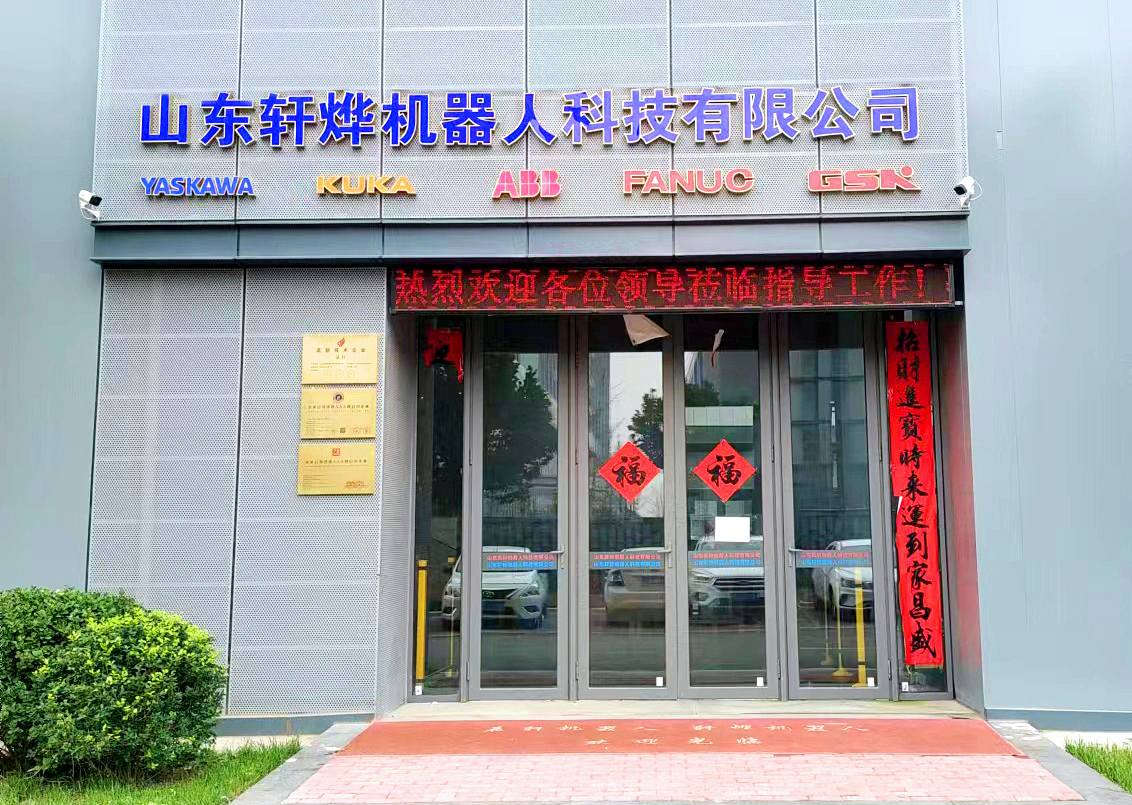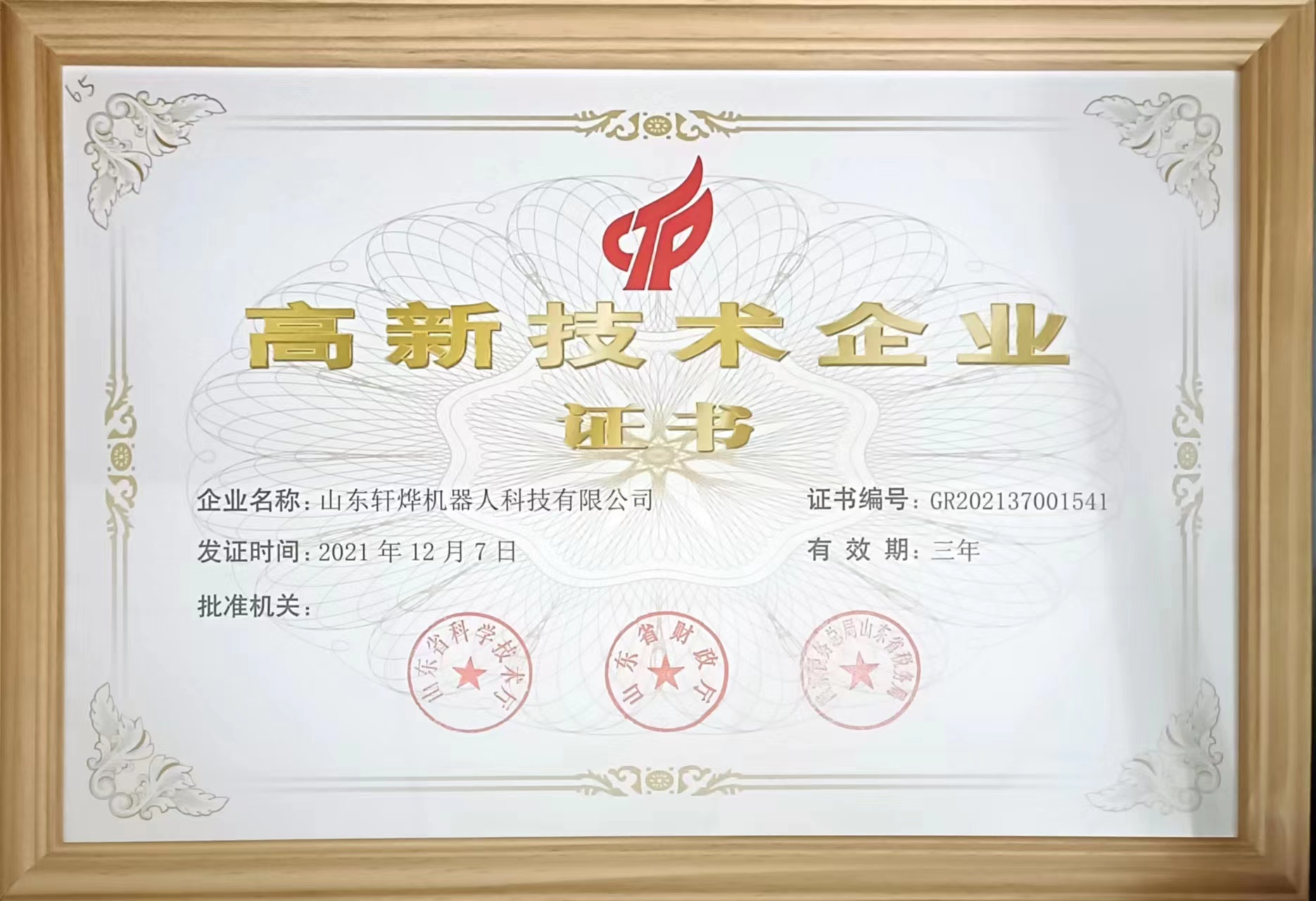
山东轩烨机器人科技有限公司是一家以工业机器人以及自动化非标设备于一体的技术企业,公司致力于焊接、切割、机器人机床上下料等领域的机器人智能化研究和产业化应用

公司立足于高端装备制造等战略新兴产业,将追逐“制造2025"致力于机器人技术和互联网技术的深度融合,推动智造。
发布:2024-05-10 浏览:0
工业机器人技术的就业方向
The employment direction of industrial robot technology
工业机器人技术是一门实用性的技术,它涉及到机器人的应用、维护和开发等方面。随着工业机器人应用的不断普及,这一领域的就业前景和职业发展方向也越来越广泛。本文将从工业机器人的就业方向和前景两个方面进行探讨。
The Industrial Robot Technology major is a practical technical field that involves the application, maintenance, and development of robots. With the continuous popularization of industrial robot applications, the employment prospects and career development directions in this field are also becoming more and more extensive. This article will explore the employment direction and prospects of industrial robotics from two aspects.
一、工业机器人就业方向
1、 Employment Direction for Industrial Robotics
1. 机器人制造厂商
1. Robot manufacturers
机器人制造厂商是工业机器人的首要就业方向。在这个领域,学生可以从事机器人设计、制造、测试和销售等方面的工作。在机器人制造厂商工作需要具备一定的机械设计、电子工程和计算机控制等方面的知识。例如,学生在校期间可以学习机械制图、电工电子技术、C语言等课程,掌握工业机器人技术的基本理论和实践技能。
Robot manufacturers are the primary employment direction for industrial robotics professionals. In this field, students can engage in work related to robot design, manufacturing, testing, and sales. Working in a robot manufacturer requires a certain level of knowledge in mechanical design, electronic engineering, and computer control. For example, students can learn courses such as mechanical drawing, electrical and electronic technology, and C language during their school years, mastering the basic theories and practical skills of industrial robot technology.
2. 机器人应用集成商
2. Robot application integrator
机器人应用集成商是将机器人应用到不同领域的公司。这个领域是工业机器人的主要就业方向之一。学生可以从事机器人系统设计、编程、调试和维护等方面的工作。在机器人应用集成商工作需要具备良好的自动化技术基础,掌握多种编程语言和操作系统。例如,学生可以学习PLC编程、运动控制技术、工业网络等课程,为从事机器人应用集成方面的工作做好准备。
Robot application integrators are companies that apply robots to different fields. This field is one of the main employment directions for industrial robotics professionals. Students can engage in work related to robot system design, programming, debugging, and maintenance. Working in a robot application integrator requires a solid foundation in automation technology, mastery of multiple programming languages and operating systems. For example, students can learn courses such as PLC programming, motion control technology, and industrial networks to prepare themselves for work in robot application integration.
3. 制造业
3. Manufacturing industry
制造业是工业机器人的另一个主要应用领域。学生可以从事机器人编程、维护和运营等方面的工作。在制造业工作需要了解各种加工工艺和流程,掌握多种编程语言和工具。例如,学生可以学习数控技术、金属切削加工技术、生产管理等课程,为进入制造业做好准备。
Manufacturing is another major application area of industrial robots. Students can engage in work related to robot programming, maintenance, and operation. Working in the manufacturing industry requires understanding various processing techniques and processes, as well as mastering multiple programming languages and tools. For example, students can learn courses such as CNC technology, metal cutting technology, and production management to prepare for entering the manufacturing industry.

二、工业机器人就业前景
2、 Employment prospects for industrial robots
随着工业机器人技术的不断发展和普及,工业机器人的就业前景也越来越广阔。未来几年,预计工业机器人技术人才的需求将继续增长。以下是工业机器人的一些就业前景趋势:
With the continuous development and popularization of industrial robot technology, the employment prospects of the industrial robot profession are also becoming increasingly broad. In the coming years, it is expected that the demand for industrial robot technology talents will continue to grow. The following are some employment prospects and trends in the field of industrial robotics:
1. 机器人制造厂商将继续招聘机械设计、电子工程和计算机控制等方面的人才,以开发更的机器人技术。
1. Robot manufacturers will continue to recruit talents in mechanical design, electronic engineering, and computer control to develop more advanced robot technology.
2. 机器人应用集成商将需要更多的机器人系统设计师、程序员和调试工程师,以应对不同领域的需求。
2. Robot application integrators will require more robot system designers, programmers, and debugging engineers to meet the needs of different fields.
3. 制造业将需要更多的机器人编程、维护和运营人员,以应对自动化升级和生产效率提高的需求。
3. The manufacturing industry will require more robot programming, maintenance, and operation personnel to meet the needs of automation upgrades and increased production efficiency.
4. 随着工业机器人的普及,新的应用领域将不断出现,例如医疗保健、公共服务、物流等领域,这将为工业机器人提供更多的职业发展方向。
With the popularization of industrial robots, new application areas will continue to emerge, such as healthcare, public services, logistics, etc., which will provide more career development directions for the industrial robot profession.
需要注意的是,工业机器人技术是一个不断更新和发展的领域。因此,学生需要具备持续学习和创新的能力,以适应行业的变化和发展。
It should be noted that industrial robotics technology is a constantly evolving and evolving field. Therefore, students need to have the ability to continuously learn and innovate in order to adapt to changes and developments in the industry.
总之,工业机器人是一个充满机遇和挑战的领域。未来几年,工业机器人技术人才的需求将继续增长,学生可以通过掌握机械设计、电子工程和计算机控制等方面的知识,为从事机器人相关领域的工作做好准备。同时,学生需要具备持续学习和创新的能力,以适应行业的变化和发展。
In short, the field of industrial robotics is full of opportunities and challenges. In the coming years, the demand for industrial robot technology talents will continue to grow, and students can prepare for work in the field of robotics by mastering knowledge in mechanical design, electronic engineering, and computer control. At the same time, students need to have the ability to continuously learn and innovate in order to adapt to changes and developments in the industry.
本文由工业机器人为您精心提供,如想了解更多请点击我们的网站:https://www.xuanyerobot.com,我们将会以的热情为您解答!
This article is carefully provided by industrial robots for you. If you want to learn more, please click on our website: https://www.xuanyerobot.com We will answer you with the greatest enthusiasm!

截屏,微信识别二维码